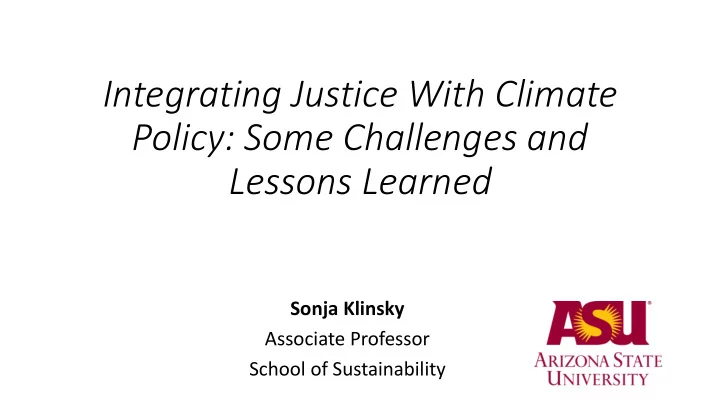

Integrating Justice With Climate Policy: Some Challenges and Lessons Learned Sonja Klinsky Associate Professor School of Sustainability
(NASA 2015) Source: USA EPA 2016
WMO 2017
But Why Is Justice Important for Climate Change Policy Scholarship?
Why Do Scholars Do Policy Research At All? • Want to work on issues that are central to human wellbeing • Want to understand core social, economic and ecological processes • Provide analyses of trade-offs and implications of policy decisions • Contribute to social, political, economic and ecological change
Unavoidable Justice Dimensions • Differences in historical responsibility for the problem • Highly uneven climate impacts • Background dynamics of inequality and persistent poverty • All of these interact across time and space at all scales • Politically Contentious: Actors WILL and HAVE ALREADY used justice arguments to shape policy responses and policy making processes
WGIII IPCC 2014 Chapter 5
CAIT Explorer: WRI 2011
"In solidarity with my countrymen who are now struggling for food back home, and with my brother who has not had food for the last three days ... I will now commence a voluntary fasting for the climate” Yeb Sano, 2012.
HDI and Emissions
IPCC WG 2, TS – Fig 4
Why Include Justice In Climate Policy Studies? • It IS and WILL be a central dynamic shaping human wellbeing • Need to understand justice dimensions of climate change in order to understand social, economic, political processes • Cannot trade-offs in policy decisions without an account of justice • If aiming for social change, justice is an unavoidable issue in the climate context
Essential but Not Easy: Some Challenges
Multi-Dimensional Frames We must deal with inequalities • Each community frames the built on challenge differently and tends to domestic What we need patterns of use and accept different forms of is an economy discrimination analysis wide clean carbon tax We need to We need to decolonize • What frame you use shapes your free up the our innovative ideologies analysis, the stakeholders you power of the We just need We need to engage with, the communication private some well start sector engineered of your work regulating sea walls large corporations
Cuts Across Scales and Ambiguously Bounded Household Village/ Close City National International Tele-coupled Community Systems Gender Social Urban planning, Boundary Relationship Decisions Abilities marginalization building codes, between amongst geographically Income (including caste, transportation domestic countries, removed have ethnicity access: all inequality embedded in enormous another other intersecting with drivers and other global implications forms), income drivers of international issues of (resource disparity, etc. marginalization drivers, capitalism, extraction, and navigating all colonialism linkages through accumulation of sets of issues capital, labour advantage market changes etc)
Perceptions of Justice are Variable �
Justice Embedded in Analytical Strategies • Any given policy tool has built in biases that privilege certain groups and kinds of considerations and inhibit the characterization of others. • E.g. IAMs unable to represent many dimensions of equity, including
Inherently Political and Raise Solidarity Issues • Because decisions are necessarily politicized, impossible to do neutral and policy relevant work • Even if you try to be neutral, your work WILL be used in a political context • As a scholar need to think about how you are positioned in relation to others • What scale, issues, communities etc. are you best positioned to work with?
Some Strategies and New Directions?
Multi-Dimensional Justice Frameworks Recognition Procedural Distributive
Topics Across Scales Klinsky and Shea 2017
Personal Reflections for a Contested Arena • Which issues am I ”seeing” and which am I not? • Which groups should I engage with, and why? • Where can I use my capacities most effectively within this system? • What do I hope to achieve with any collaboration? • What do my collaborators hope to achieve? • And who will benefit – or be harmed – by my actions?
So Much Space for New Work! • Climate and justice work is just starting across a wide range of sectors • All sectors of vulnerability studies • Increasingly recognized within climate mitigation work (and all sectors there: built environment, urban form, energy, water management, waste management etc) • Increasing interest in ‘non - naïve’ research that focuses on key actors (i.e. fossil fuel companies or other central actors) • Ongoing effort to try to integrate justice into existing tools of analysis so that it is not an “add on” • Efforts needed to integrate “snapshots” of inequality with scholarship on the dynamics of (in)justice
Please Reach Out! Sonja.klinsky@asu.edu
Recommend
More recommend